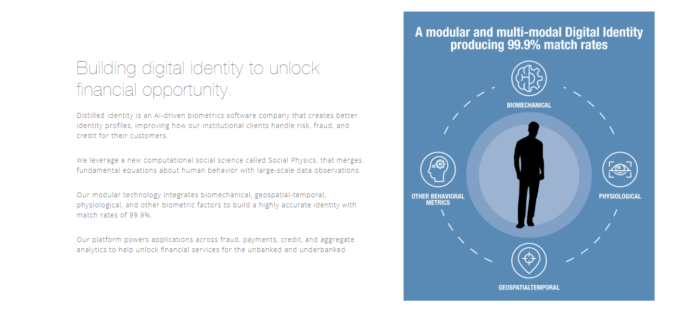[ad_1]
Distilled Identity has announced, in Davos this week at the TCS and MIT Summit on Unlocking Human Potential with Blockchain & AI, a new partnership with Emerge to co-develop the Identity profile layer of an Identity Management and Intelligent Resettlement Platform for Refugees.
“With over one billion people in the world lacking a legal identity, and billions of personal records stolen for the purpose of identity theft, we need to reinvent the system to better serve the poor and dispossessed, while better protecting the developed world at the same time,” offered David Shrier, Founder and CEO of Distilled Identity. “Predictive analytics developed on top of a strong biometric identity layer can help deliver services to those who need it most.”
“Moreover, there have been 46 major world incidents resulting in the displacement of more than 151 million people globally during the last half-century,” added Lucia Gallardo, founder of Emerge. “Less than 3 million of these refugees resettle within the year of their displacement, making this an unprecedented humanitarian crisis.”
The announcement was Distilled Identity and Emerge are working together to develop a government-recognized identity for forcibly displaced persons who find themselves in a stateless position, often at risk, and in transit. Named Homeward, the Emerge technology platform compiles physical and behavioural biometric data into a smart contract in order to provide refugees with self-sovereign identity.
The numbers don’t lie. In 2017 alone, according to the UNHCR Annual Report for 2017 and UNICEF Brief of Children on the Move, 68.5 million people were forcibly displaced, with 21 million of those identified as refugees and less than 103,000 of those individuals resettled. To complicate this further, it is estimated that nearly half of these refugees are children under the age of 18 years old. There are 44,400 new displacements daily. More than 70,000 new stateless children are born every year in the 20 countries hosting the world’s largest stateless populations.
“In addition to their present circumstances, displaced people often face another challenge as they are unable to present themselves as valuable contributors to a host country,” added Gallardo. “Homeward’s focus on employability potential allows every claimant the opportunity to leverage untapped strengths and dispel the burden narrative by making a match.”
Using Technology to Create Identity
Homeward provides matched cities with a summary profile on their new residents, to ensure officials can better triage support services and provide a customized welcome experience conducive to quicker independence. By factoring in more cities, the platform can help disperse claims away from overburdened sanctuary cities while allowing other cities to benefit from the potential influx of talent. The technologies that power the platform include Distilled Predictive Identity, IoT Security Solutions, Blockchain, and IBM Watson.
Specifically, Homeward includes a multi-layered identity profile made up of (1) physical biometric data, (2) employability potential and socio-cultural preferences data, (3) behavioral biometrics, (4) geospatial-temporal data, and (5) a smart contract based public key infrastructure to form a unique, self-managed digital ID for each primary claimant. A claimant’s employability and preferences data are used to determine a match to an optimal city for resettlement. Other factors included in determining the optimal match include destination city quotas, destination city’s cultural community sizes, population density, local economic data, age dependency ratios, and family size (to ensure families stay together).
Pilot launch phase one of the Homeward Project will begin in April 2019, targeting approximately 20,000 refugees, pulling half of these displaced from the conflict in Syria and the other half to include economic migrants from Central America and the Caribbean. Later phases will pull another 10,000 refugees from each circumstance of natural disasters, homelessness, and other internally displaced populations.
Emerge uses emerging technologies to address some of the world’s most pressing issues, as defined by the United Nations Sustainable Development Goals.
Homeward is an identity management and intelligent resettlement system for displaced populations. Theseus is a logistics solution to transparently track, trace, and optimize the global movement of goods while reducing waste and fostering fair economic opportunities. Trusted Voices creates an immutable chain of custody for the source material used in today’s news.
In 2017, Emerge also published Leap, the world’s first report to track blockchain ecosystems in emerging markets. The 2018 version of the report is forthcoming. The company was nominated for a 2018 Global UN SDG Award as well as Newsweek’s 2019 Blockchain Impact Awards.
Distilled Identity is an AI-driven biometrics software company that builds better identity profiles for financial services institutions, improving how they handle risk, fraud, and credit. The company was founded to translate advanced biometrics and data science research from leading academics at MIT, The University of Oxford, and Imperial College London into action. Distilled Identity’s innovative Predictive Identity platform enables next-generation digital identity applications, to reduce fraud, improve authentication, enhance credit models, and conduct powerful aggregated human activity analytics.
The company is led by a team of industry veterans and quantitative experts, backed by investors including financial innovation pioneers. Distilled Identity, formerly known as Distilled Analytics, is collaborating with global financial institutions to solve the identity crisis. To learn more about Distilled Identity, visit www.distilledidentity.com.
- Distilled Identity and Emerge Announce Technology Partnership to Solve Global Identity Crisis for Refugees – January 22, 2019
- Satellite Project SpaceChain Concludes the First Qtum Blockchain Transaction in Space – January 22, 2019
- AAX Digital Asset Exchange to be Powered by London Stock Exchange Group Technology – January 22, 2019
- Amsterdam’s Blockport Launches Full Featured Trading Platform – January 22, 2019
- Swarm Offers Free Issuance of Security Tokens – January 21, 2019
- London’s Blockchain Conference; Blockchain Expo Global Exhibition announces expert speakers – January 21, 2019
- Currency.com Launches Tokenised Securities Trading Platform – January 21, 2019
- Katallassos Launches a Standard Framework for Decentralised Derivatives – January 11, 2019
- Dutch Crypto Trading Marketplace Cryptohopper at CES 2019 – January 8, 2019
- Interview with Ammbr – A Blockchain-Enabled Mesh Network Bringing High Speed Internet to Emerging Economies – January 8, 2019
- Zion Market Research Report Explains: Global Blockchain In Energy Market likely to grow to USD 11,899 Million By 2024 – December 27, 2018
- Blythe Masters Resigns as CEO of Digital Asset – December 18, 2018
- Overstock’s Medici Ventures Uses Ravencoin Blockchain for Equity Purchase in Chainstone Labs – Completes $3.6 Million Securities Token Transfer – December 18, 2018
- Despite Market Downturn – eToro Survey Reveals Strong Interest in Cryptoasset Education – December 18, 2018
- BlockIMMO brings Blockchain Technology Platform to Tokenize Fractional Real Estate Investment – December 17, 2018
- Algorand Appoints Dual Ph.D. Rock Star Pablo Azar as Chief Economist – December 17, 2018
- Dascoin – Anatomy of Multilevel Marketing Crypto Scam – Coinmarketcap Zero – December 17, 2018
- Dutch Blockchain Company Tymlez Group Starts Trading on Australian Stock Exchange (ASX) – December 13, 2018
- DNAtix Releases Live Demo of its Blockchain based Genetic Infrastructure Platform – December 11, 2018
- IOHK Launches Secure Smart Contracts Technology for Cardano blockchain – December 11, 2018
!function(e,n,t){var o,c=e.getElementsByTagName(n)[0];e.getElementById(t)||(o=e.createElement(n),o.id=t,o.src=”http://connect.facebook.net/en_CA/sdk.js#xfbml=1&version=v2.11″,c.parentNode.insertBefore(o,c))}(document,”script”,”facebook-jssdk”);
[ad_2]
Source link


